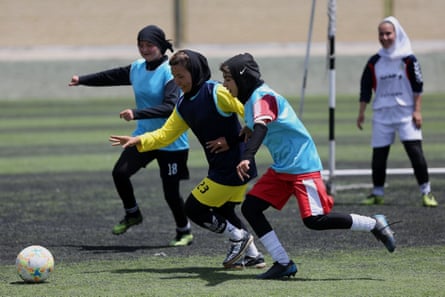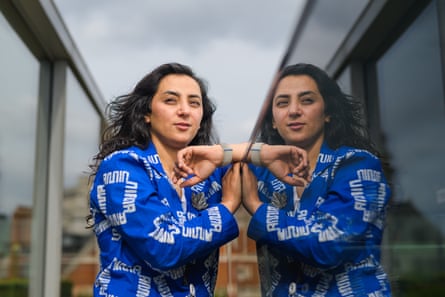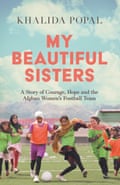In 2003, the Taliban had been removed from power in Afghanistan for two years, but their influence and ideology still ran deeply through society.
“Whores,” the man hissed.
The men called out insults to our families for letting us play football, snatching up our bags and tipping them upside down, sending schoolbooks flying into the air and tumbling to the ground. They kicked our goalposts made of stones disdainfully away and painstakingly scuffed our pitch lines into obscurity in the dust. The ringleader grabbed a scarf that lay on the floor and shoved it hard into the face of one of the players, sending her stumbling backwards. Then, silent and seething, somehow more terrifying than he was before, he strode into the centre of the yard, a mixture of rage and pleasure in his expression. Revealing a large knife that he held up in front of us dramatically, he proceeded to stab into our football: once, twice, a third time. Then he threw it to the ground. It was a performance, like a magician putting on a show, but it was also a very real threat.
To be a young woman in Afghanistan is to grow up with violence. To learn not to fight back. To fight back is to risk being killed. If you are beaten it’s because you were at fault, you must have done something wrong. There were 20 of us in the yard that day, far more of us than of them, but there was nothing we could do, because we knew the consequences. Our crime? Kicking a ball, playing sport, having fun.
We watched as the object that allowed us an escape for an hour a day lay crumpled on the floor. The man walked back to his friends and they all laughed, looking over at us, spitting on the ground before they climbed back over the wall. When they were gone, a feeling of relief rippled through the group. The ten of us exhaled at the same time.
“I told you this would happen,” said one of the girls, shaking her head. Another stifled a sob.
This had all started with me kicking a ball in the schoolyard.
Our school was surrounded by tall concrete walls, which were both oppressive and freeing. They protected us girls from prying eyes and allowed the public to ignore our existence. While I waited for my mum to finish teaching, I would help myself to a ball and kick it around the yard. We didn’t have any courts or pitches, just the hard stones. I would try and stay quiet to avoid drawing attention to myself, so I didn’t kick the ball against the walls, but I would dribble it around and this allowed me to escape mentally. That is how my football journey really started.
Some of the girls in the younger classes saw me. They watched and chatted, moved on, and occasionally spoke to me. One day I was dribbling the ball around, imagining the players I was beating falling into the dust around me, when I felt someone watching. She was a couple of years younger than me, but already slightly taller, with short hair. I dribbled the ball over to her.
“I’m Khalida,” I said.
“You need to use your other foot more,” she said, frowning slightly.
“OK, coach,’ I said, smiling. “What should I call you?”
“I’m Samira,” she said.
And then, we were two. A tiny team.
Samira’s story was like mine. Her love of sport was forged outside the oppressive culture of Afghanistan. In Iran she had played football with her brothers and found a sense of freedom in it. She was good, far better than me. She started to teach me the game properly. Before meeting her, all I had known was how to chase the ball. There was little else I could do; I didn’t have any talent or skills. I just ran and kicked, intuitively following the ball rather than actively controlling it. Her personality was very different to mine: she was thoughtful and much quieter. I would run around clowning, trying to make her smile, and she would look at me, slightly puzzled, as if I was a dog riding a bicycle.
We had fun, and we could tell that people were taking an interest. So many girls had forgotten what fun looked like, and we were enjoying ourselves. Some would stand and watch, clearly wanting to join in. So we would go and ask them to play. Many didn’t, walking away shyly. But some did.
Then we started approaching girls and expanding our ranks. We committed to getting to school early to play before classes began. School began at 7am and so we aimed to get in at 5 or 6 am. It was so liberating. We wore our school uniforms, we didn’t change and we didn’t care if we smelled afterwards. I would take in wet wipes and some perfume (which was banned), so the smell wasn’t too bad. I sweated a lot and I was very self-conscious of it, but I wasn’t going to let that stop me.
With the school quiet, we could be ourselves, we could talk, and we could also celebrate, shout and express ourselves playing football. These were new experiences and new emotions. Girls shrieking with glee at having wrongfooted the goalkeeper, before lashing the ball between the rock-goalposts against the wall, which we imagined would ripple like a net – this was not normal or accepted. Shouting for my teammate to pass me the ball or gasping loudly as my leg entwined with another’s, seeking to grapple the ball free of their possession, was utterly exhilarating. These girls had spent their lives being taught that women were to exist in the shadows, on the periphery.
I organised the players around me and together our voices became louder. We embraced being vocal, brash and playful, and our eyes were opened to new emotional heights we didn’t realise were possible. On the football pitch we were in charge for the first time. We made decisions. Should I pass the ball? Should I take a shot? Should I move into this space? Should I dive left or right to try and make a save? We had control. We were laser-focused. And we lapped up the opportunity to think independently.
After a few months, we had enough girls to make up two teams that could play against each other, which transformed the game for us. We would chuck down our school bags and play, the material of our hijabs catching in the wind as we ran, laughter ringing round the yard. Some girls played on the stony ground without shoes on. Others had shoes that were so ill-fitting and unsuited to football that if they kicked the ball their shoe would fly into the air with it, sending us all into hysterics. It was liberating, and so much fun.

Many young women joined us, of all different ages. We hid what we were doing from the principal and the teachers. We knew that they would be resistant to our activities, since it was risky for them to permit it. They were focused on shaping us into the traditional image of young womanhood: women were expected to be calm, timid and quiet, to stay home and clean, to live a life of service and to eventually bear children for their husbands. Deviating from this in any way was severely frowned upon, so we stood out as troublemakers. We began to gain reputations for having bad manners and for being brought up in the wrong way.
One evening, my mum came to my room. “Khalida, there is a rumour you are playing football at school.”
“It’s not a rumour,” I said. “We are. There are lots of us. We love it.” I was embarrassed to find that there were tears in my eyes. My mother nodded and touched my face.
From that point on, she did what she could to enable us. She wanted to give us the opportunity to continue and to expand, and she took great risks by doing so. I sensed that she was living vicariously through us, in a way. Her dreams had been taken away from her at a young age when she was forced to marry, and so in her view she would do everything she could to make sure that us girls had opportunities she didn’t have. She wanted us to access the things we were interested in and passionate about, whatever that might be. In our case it was football. She lived through our smiles and energy, through our belief that we could push back against society’s expectations of us and that things could be different.
I became known as the crazy football girl in school, but at the same time I was working extra hard in my classes to make sure that there was no excuse to end the extracurricular activity.
I didn’t want my parents to see football as a barrier to my education. I felt the pressure to excel in every subject to make sure that I didn’t lose football. It was the only happiness my teammates and I had. What had been my escape became their escape too. A small place, a bubble in the world, where we reclaimed our lost childhoods, where the predetermined futures mapped out before us, based solely on our sex, dissipated temporarily. Football allowed us to feel free. It was like magic.
There was a problem though: the noise of our voices, the shouts and sighs of our newly discovered passion carried beyond the concrete walls. We didn’t realise that people were listening on the other side. The walls made us feel like the outside world didn’t exist, but it did. People had started to pay attention on the other side, wondering what we were doing and why we were still in school in the midday heat. They were curious, confused by the sounds. And so, our sanctuary was breached.
We did take precautions; we made new rules to try and avoid attention. We played silent football. We decided we could have no screaming, no shouting, no celebrating, nothing. Silence. If we stayed quiet, hopefully whoever was lurking on the other side of the wall would lose interest. Silent football is unrealistic, though. You cannot control your emotions during a game. It’s natural to express joy, pain, frustration, disappointment. It’s instinctive, and we failed to contain ourselves.
The day when a body swung over the top and thudded down into the yard, then another, and another, and another, until there were five men looking curiously at our makeshift pitch, punctured our joy with the reminder that we were not free. The attack illustrated to me just how powerful football could be. It was more than a game, and it could be used as a tool for pushing back against what they told us we could be.
Before they left, they walked around mockingly, like zombies, arms outstretched, legs straight with a stuttering gait. They said women couldn’t walk properly as they staggered sardonically through our safe space. “Women walk like this. How can they play football? Football is for men. It’s a man’s game. It’s not for women. Go wash the dishes. Clean the house. Go give birth.” I felt like if we stopped playing football, we would be letting them win. We would be accepting defeat. This would impact how we saw ourselves: instead of strong, autonomous individuals we would be victims. We would come to see ourselves as inferior, the way they wanted us to feel. But what they said didn’t make sense – it was nonsense – and it made me question how deep the problems in our society and in our country were.
These men had come into my space, my safe zone, near my home, into my school, in my community, in my country, and tried to stop me from being me. No. I would not acquiesce. They would not win.

I didn’t have any answers to this new problem and how to navigate it, but I knew that giving up wasn’t an option at all. I knew there were always two choices – to take action or give up – and I would fight tooth and nail rather than down tools. The day after the men climbed the wall, I turned up at our usual time, only to find fewer than half of the girls there.
“Where is everyone?” I said to Samira.
“Isn’t it obvious?” she said.
Across the yard, I saw a girl who normally played with us walking quickly in the opposite direction with her head down. “Hey! Where are you going?” I caught up with her. “Hey,” I said more gently. “You can’t let them win.”
“We’re not all lucky like you, Khalida,” she said wearily. “My father will beat me half to death if he finds out about this. Then he’ll stop me coming to school at all.”
“But you’re so good,” I said. She looked at me with something like pity.
“That doesn’t matter,” she whispered. Then she carried on walking.
I was very aware that I came from different circumstances to almost all the other girls. Like them, when I was out in the world, others made decisions on my behalf. I couldn’t wear my hair short or walk the streets without my headscarf, otherwise I would be judged. Everything about my appearance and behaviour was judged by society, and I had to act accordingly for my own safety. Likewise, at school, I had little choice and zero control. Teachers controlled what I could do and say. I was unable to push back, even in the most respectful way, without being treated as insolent and a troublemaker. But when I got home and shut the door to the world outside, I had a supportive family who were on my side. A father and brothers who were not like the man with the knife, who would defend me against them. Most of the other girls went home to men who were like that man.

I was so angry and frustrated. These men, with their knives, their power and their violence, had taken away the one thing that made us happy. They killed a small hope that had been growing among us. After we had finished playing a three-a-side game one day, Samira and I lay with our heads on a goalpost.
“This isn’t working,” I said. “We need more players.”
“Well, who?” said Samira. “We’ve already gone around the whole school. And most of the ones who said yes are now terrified that men are going to come climbing over the wall again.
“Face it: they’re not coming back.”
I sat up. “Then we need to find other schools.”
Source: theguardian.com


















